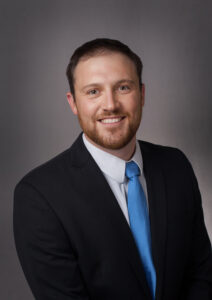 Benjamin Widener, MD, FACP, is a rheumatologist with Sheridan Memorial Hospital, Wyoming, and opened the hospital’s rheumatology practice in August 2020.
Benjamin Widener, MD, FACP, is a rheumatologist with Sheridan Memorial Hospital, Wyoming, and opened the hospital’s rheumatology practice in August 2020.
As a community practice rheumatologist, he faces certain challenges and opportunities that may not be as prevalent in academic rheumatology or other settings. Dr. Widener recently spoke with The Rheumatologist to share more about his work.
The Rheumatologist (TR): Could you say a little about your background in rheumatology? How long have you worked in the specialty and how long have you been at your current location?
Dr. Widener: My background is a little atypical. I finished residency in internal medicine and moved to my hometown in Sheridan, Wyo., and practiced primary care for about four years prior to entering rheumatology. I had very much enjoyed my previous role, but I found my joy in the rheumatology cases I was seeing in the primary care world.
Unfortunately, we had limited access to rheumatology services [in Wyoming], so I decided to pursue a fellowship. I completed my rheumatology fellowship at the University of Nebraska Medical Center in Omaha in 2020 and then moved back to Sheridan, where I have been in practice ever since.
I have been employed in community practice by our county hospital as the lone rheumatologist for the community and surrounding communities since that time, although we are actively planning to add an additional rheumatologist. I work closely with a nurse, medical assistant, receptionist and other part-time ancillary staff, who are 100% essential to provide highly effective care for our patients.
TR: Why did you choose private practice over a career in academia or research?

Dr. Widener
Dr. Widener: I really enjoy patient care. While I do get to do some teaching of medical students intermittently, which I also enjoy, seeing patients and developing those therapeutic relationships is the reason I am in medicine. Research is essential to advance the field, and I value it greatly, but it wasn’t my calling. I am very fortunate to get to work where I grew up and be able to provide quality, specialty care to my community. It’s truly a privilege.
I chose to work for the hospital vs. starting my own business due to the relationship I have had with [the hospital]: I am provided a large amount of autonomy to provide care. It is not the same as working for a large healthcare system in other places. I can quickly make an impact on how I am providing care here with very simple decisions and minimal bureaucracy. Although traditional private practice has near unlimited autonomy, my current situation works very well for me in that regard.
TR: What is your biggest practice headache? What could the ACR do to help alleviate it?
Dr. Widener: Third-party payers dictating prescribing patterns with prior authorizations and step therapy are the biggest challenge. I think the ACR actually does quite a bit to work on these matters [through member donations received for] RheumPAC, so I think [these issues] are being addressed, but getting more support from members to help raise our voice in these matters is always needed.
On a day-to-day basis, the lack of other rheumatologists regionally leaves quite a load to manage and new patients to address, but that’s not so much of a headache as an expected difficulty. Continuing to encourage graduating fellows to consider community practice in a wide variety of locations is needed to better spread out the rheumatology workforce.
TR: What do you think your peers in research or academia should know about your practice?
Dr. Widener: The way in which I practice on a day-to-day basis has to be efficient and practical—to the best of my ability, at least. As much as I love to get into the deep, dark details, it’s not always feasible in purely clinical practice. Rheumatology is an inherently detail-oriented field of medicine, but in the routine of day-to-day practice we have to learn very quickly what details matter and what can be sorted out later.
I also think it’s important to note that my practice is affected by what researchers are doing and the questions they are trying to answer. I think much is made of the difference between academics and clinical practice, but this is just really different approaches. Both are valuable. It’s important to understand the perspective of both the academic clinicians, who focus on research and teaching, and that of primary clinical rheumatologists, who overwhelmingly spend their time treating patients.
TR: What do you do outside medicine to maintain balance in your life, such as specific activities or hobbies?
Dr. Widener: I love having the time to spend with my wife and two sons. We like to enjoy the outdoors—hiking, camping, fishing. I try to make time to play guitar, and during the fall I spend a fair bit of time hunting, especially with my English setters, looking for upland bird game.
Vanessa Caceres is a medical writer in Bradenton, Fla.



